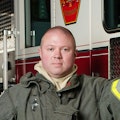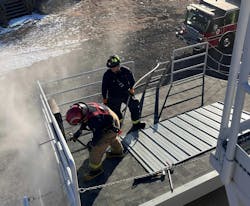Are Fire Academies Keeping Up with Generational Differences?
Recently, I started to think more and more about the scenes of fire academy training that appear in my social media feeds. What stood out was the militaristic nature of some of them: marching in formation, instructors yelling, etc. If I closed my eyes, I just as easily could believe that I was listening to a reel of one of our military branch’s basic trainings. I saw fire academy training clips like these many times over the years, but something this time made me chuckle and think, “Really?”
The American fire service is well known to be resistant to change, and I’m just as guilty as the next person, but those of us who are in leadership roles have a duty to ask the questions that we find scary, such as, “Why are we doing it like that?” and “Is there a better way to do this?” At a time when many departments struggle to build decent-size candidate pools, we must look at all of the aspects of our department that might be affecting recruiting.
Recruit training review
Any of my fellow senior fire service members (15-plus years) know that all generations aren’t created equal. We have Generation Z (those who were born from 1997–2012) entering our ranks now. We have a solid group of millennials among us (1981–1996), and quite a few of us who have bugles on our collars hail from Generation X (1965–1980). Last, but certainly not least, there still are quite a few of our brothers and sisters of the baby boomer generation out there (1946–1964).
If you are in a leadership role, you likely read articles or attended training about how to effectively lead and teach with generational differences in mind. (If you haven’t, you should.) Each generation came up in different social and political atmospheres, which, for better or worse, shape who individuals become as well as their needs, wants and values.
This likely is a controversial topic, which probably is even more reason to ask, “Why might we be operating our fire academies the way that we are?” If it’s working for you, keep on running with it. However, if you’re struggling to attract candidates, maybe your recruit training should undergo a review.
We are guilty of doing things a certain way because “that’s how we were trained.” Maybe a certain style worked 20 years ago but isn’t ideal now. It’s easy to cast aspersions on the younger generations and blame the lower application count on them. “They don’t want to work hard.” “They can’t handle stress.” “They’re lazy.” I’ve heard all of these. Maybe the younger generations are turned off by what they see in recruiting videos.
Gen Z and millennials are voracious social media users. This can be a very good thing when your department excels at social media marketing, but only if these potential candidates like what they see. Social media can be our worst enemy just as easily as it can be our best friend.
I know that I see some of these reels of recruits marching in formation and think, “If I wanted to join the military, I’d join the military.”
Some of these images aren’t representative of what the day-to-day life of a firefighter is like, but when recruiting videos have a lot of these kinds of scenes, the potential candidates might not get past that in their consideration. According to the U.S. Department of Defense, military enlistment in 2020 hit a 40-year low. Granted, one cause is more potential enlistees failing to meet basic fitness requirements, but a major reason that was cited was dislike of the “military lifestyle.” Is this dislike of the military lifestyle turning away good fire service candidates who believe that’s what fire departments are like based on your academy?
Questioning the reasoning
The younger generations question things more, in contrast with the blind obedience that’s more prevalent among the older generations. As long as younger people are respectful of rank and the chain-of-command, their propensity to question things isn’t necessarily a bad thing. I know that it can irk some of the older members at times, but questioning why things are done the way that they are is something that we should do in our job if we want to do the best that we can.
I’ve had good conversations with friends who work in law enforcement about this topic. I even have a coworker who is a U.S. Army veteran who left law enforcement and went to work for a fire department because he found the law enforcement agency too militaristic, which he was ready to leave in his past. Luckily, the fire department he was hired into didn’t have a military-like academy, and he is thriving in the fire service. It makes me wonder whether we potentially are turning away job-seeking veterans because of our academies? Maybe, maybe not, but it’s something to consider, nonetheless.
Introspection
I know that the fire service is a paramilitary organization, with a rank structure and a chain of command. Where does this end? To what extent is it taken? Obviously, this varies from department to department, but by some of the reels that I saw, some confuse the fire service with the Marines. Some people might argue that it builds discipline. Aren’t there other ways? Some might argue that it conditions recruits to handle stress. Can’t this be taught through scenario training? I know plenty of firefighters who spent their career in departments that didn’t have militaristic training academies, and they had highly successful careers.
I’m not here to call out any specific department or offend anyone. I’m just stressing that departments that might be having a difficult time recruiting should take an introspective look at how they train their recruits, because you might be surprised at what’s discouraging potential candidates from applying.
If we are to be responsible to the people of our community who rely on us in their time of need, from time to time, regarding all aspects of our operations, we should ask, “Is there a better way?”
About the Author

Kyle Starr
Kyle Starr is a captain/paramedic with Columbus. MT, Fire Rescue who serves as fire/EMS training officer. He previously served as assistant chief of Red Lodge, MT, Fire Rescue. Starr has been in fire/EMS for 28 years.
